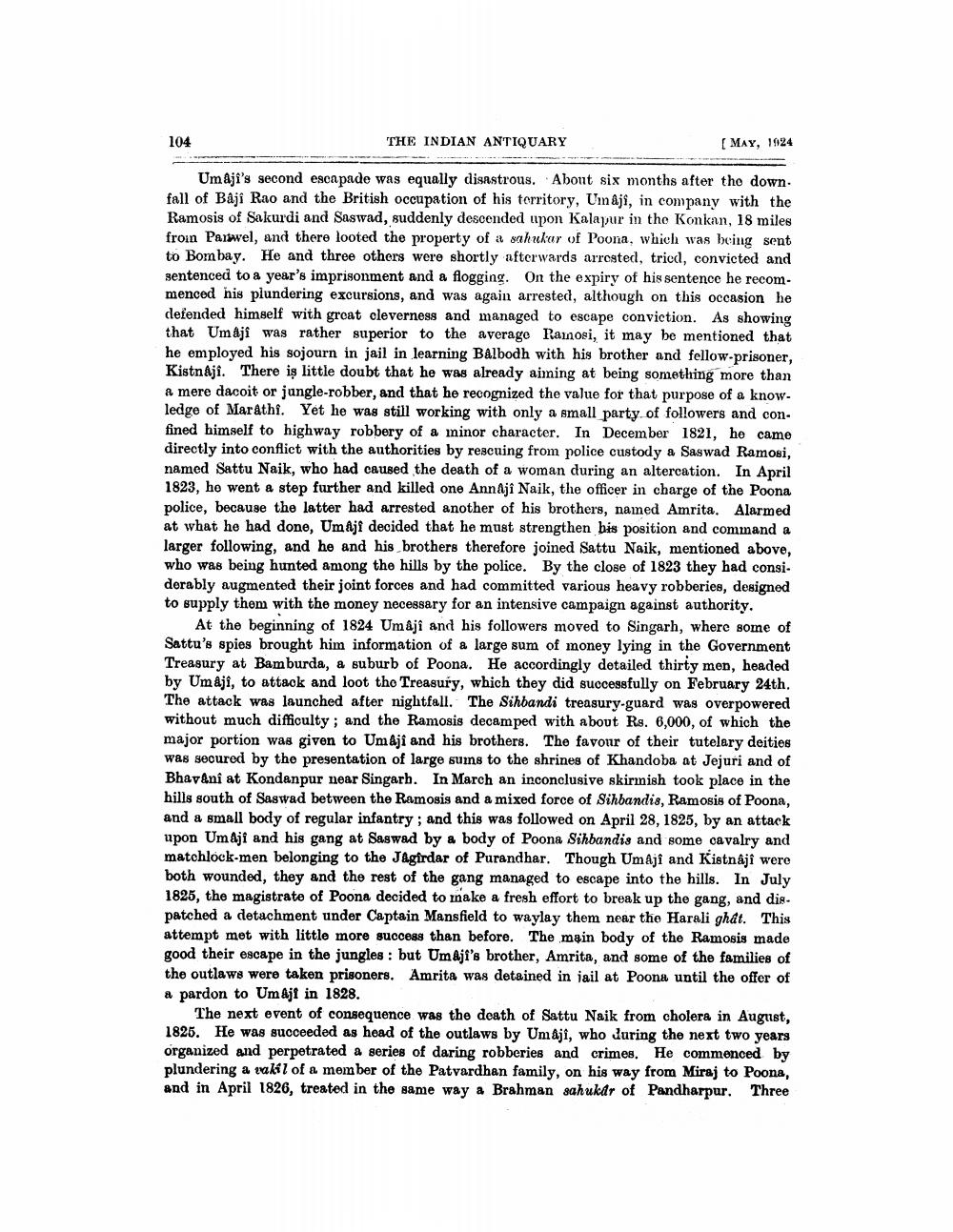________________
104
THE INDIAN ANTIQUARY
[ MAY, 1924
Umaji's second escapade was equally disastrous. Abont six months after the down. fall of Baji Rao and the British occupation of his territory, Unaji, in company with the Ramosis of Sakurdi and Saswad, suddenly descended upon Kalapur in the Konkan, 18 miles froin Pariwel, and there looted the property of a sahukur of Poona, which was being sent to Bombay. He and three others were shortly afterwards arrested, tricd, convicted and gentenced to a year's imprisonment and a flogging. On the expiry of his sentence he recommenced his plundering excursions, and was again arrested, although on this occasion he defended himself with great cleverness and managed to escape conviction. As showing that Umaji was rather superior to the average Raunosi, it may be mentioned that he employed his sojourn in jail in learning Balbodh with his brother and fellow-prisoner, Kistnají. There is little doubt that he was already aiming at being something more than a mere dacoit or jungle-robber, and that he recognized the value for that purpose of a knowledge of Marathi. Yet he was still working with only a small party of followers and confined himself to highway robbery of a minor character. In December 1821, he came directly into conflict with the authorities by rescuing from police custody a Saswad Ramosi, named Sattu Naik, who had caused the death of a woman during an altercation. In April 1823, he went a step further and killed one Annájî Naik, the officer in charge of the Poona police, because the latter had arrested another of his brothers, named Amrita. Alarmed at what he had done, Umáji decided that he must strengthen bis position and command a larger following, and he and his brothers therefore joined Sattu Naik, mentioned above. who was being hunted among the hills by the police. By the close of 1823 they had considerably augmented their joint forces and had committed various heavy robberies, designed to supply them with the money necessary for an intensive campaign against authority.
At the beginning of 1824 Umaji and his followers moved to Singarh, where some of Sattu's spies brought him information of a large sum of money lying in the Government Treasury at Bamburda, a suburb of Poona. He accordingly detailed thirty men, headed by Umaji, to attack and loot tho Treasury, which they did successfully on February 24th, The attack was launched after nightfall. The Sihbandi treasury-guard was overpowered without much difficulty; and the Ramosis decamped with about Rs. 6,000, of which the major portion was given to Umaji and his brothers. The favour of their tutelary deities was secured by the presentation of large sums to the shrines of Khandoba at Jejuri and of Bhav&ni at Kondanpur near Singarh. In March an inconclusive skirmish took place in the hills south of Saswad between the Ramosis and a mixed force of Sihbandis, Ramosis of Poona, and a small body of regular infantry; and this was followed on April 28, 1825, by an attack upon Umáji and his gang at Sagwad by a body of Poona Sihbandia and some cavalry and matchlock-men belonging to the Jagirdar of Purandhar. Though Umáji and Kistnaji were both wounded, they and the rest of the gang managed to escape into the hills. In July 1825, the magistrate of Poona decided to inake a fresh effort to break up the gang, and dig. patched a detachment under Captain Mansfield to waylay them near the Harali ghất. This attempt met with little more success than before. The main body of the Ramosis made good their escape in the jungles : but Umaji's brother, Amrita, and some of the families of the outlaws were taken prisoners. Amrita was detained in jail at Poona until the offer of a pardon to Um Ajf in 1828.
The next event of consequence was the death of Sattu Naik from cholera in August, 1825. He was succeeded as head of the outlaws by Umaji, who Juring the next two years organized and perpetrated a series of daring robberies and crimes. He commenced by plundering a rakil of a member of the Patvardhan family, on his way from Miraj to Poona, and in April 1826, treated in the same way a Brahman sahukar of Pandharpur. Three




